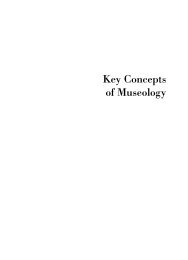ISS 25 (1995).pdf - The International Council of Museums
ISS 25 (1995).pdf - The International Council of Museums
ISS 25 (1995).pdf - The International Council of Museums
You also want an ePaper? Increase the reach of your titles
YUMPU automatically turns print PDFs into web optimized ePapers that Google loves.
events in France.in 196B. started the new movement<br />
among the French museums. New notions c ame into the<br />
museum world as: identity . territory. participation<br />
o r community. In the eighties the rentability o f<br />
museums and the prestigious arc hitectural projects<br />
pressed out the notion <strong>of</strong> community. Stating that<br />
the traditional communities have split and that<br />
individualism has got stronger, she notices the new<br />
social groups that have a need for museums:<br />
illiterates, immigrants rejected by the nationals,<br />
the unemployed left outside the working community.<br />
Posing questions like: how can museums cope with<br />
such situation, or , are there new forms <strong>of</strong> museal<br />
action to imagine, she opens the discussion about<br />
the new position and forms <strong>of</strong> museums.<br />
Lynn Haranda, from the Vancouver Museum in<br />
Canada in her paper '<strong>Museums</strong> and the community'<br />
tries to present analytically the given relation.<br />
Discussing more the concept <strong>of</strong> community than <strong>of</strong> the<br />
museums. she states that museums serve a community<br />
only by answering the fundamental questions on human<br />
existence . Community is an aggregate <strong>of</strong> people with<br />
a joint interest neighbourhood , pr<strong>of</strong>ession.<br />
intellectual inquiry , nationalist motives.<br />
Identifying the contemporary pressure. the conflict<br />
and the political meaning, she tries to search for a<br />
solution, saying that museums are becoming<br />
responsive to a variety <strong>of</strong> community voices and<br />
sensitive to financial relationships, Pleading for<br />
more complete studying <strong>of</strong> the public reactions ,<br />
sentiments and desire, she states that communities<br />
use the museum as a power basis from which to<br />
disseminate their messages.<br />
Raymond Hontpetit from the University <strong>of</strong> Quebec<br />
in Montreal, Canada, in his paper '<strong>Museums</strong>.<br />
interpreters <strong>of</strong> heritage for community<br />
appropriation' emphasizes the heritage belonging to<br />
the communities, discussing the features <strong>of</strong> heritage<br />
as: the living heritage <strong>of</strong> traditional cultures, the<br />
heritage <strong>of</strong> collections, the museum heritage and the<br />
cultural resources <strong>of</strong> postindustrial societies. He<br />
states that the present state <strong>of</strong> heritage is marked<br />
by hesitating between the 'national' and 'global'<br />
heritage. Presuming that a heritage is today defined<br />
in a more economic perspective as a leisure<br />
resource. he sees the importance <strong>of</strong> tourism and<br />
information highways as ways <strong>of</strong> reaching the global<br />
community.<br />
Teresa Cristina Scheiner from Brazil, in her<br />
paper 'On museum, communities and the relativity <strong>of</strong><br />
it all', insists on the relativity <strong>of</strong> museums.<br />
Discussing the idea <strong>of</strong> museum and museology she<br />
stresses two basic characteristics <strong>of</strong> the museum:<br />
its intrinsic relationship with nature and culture,<br />
12
















